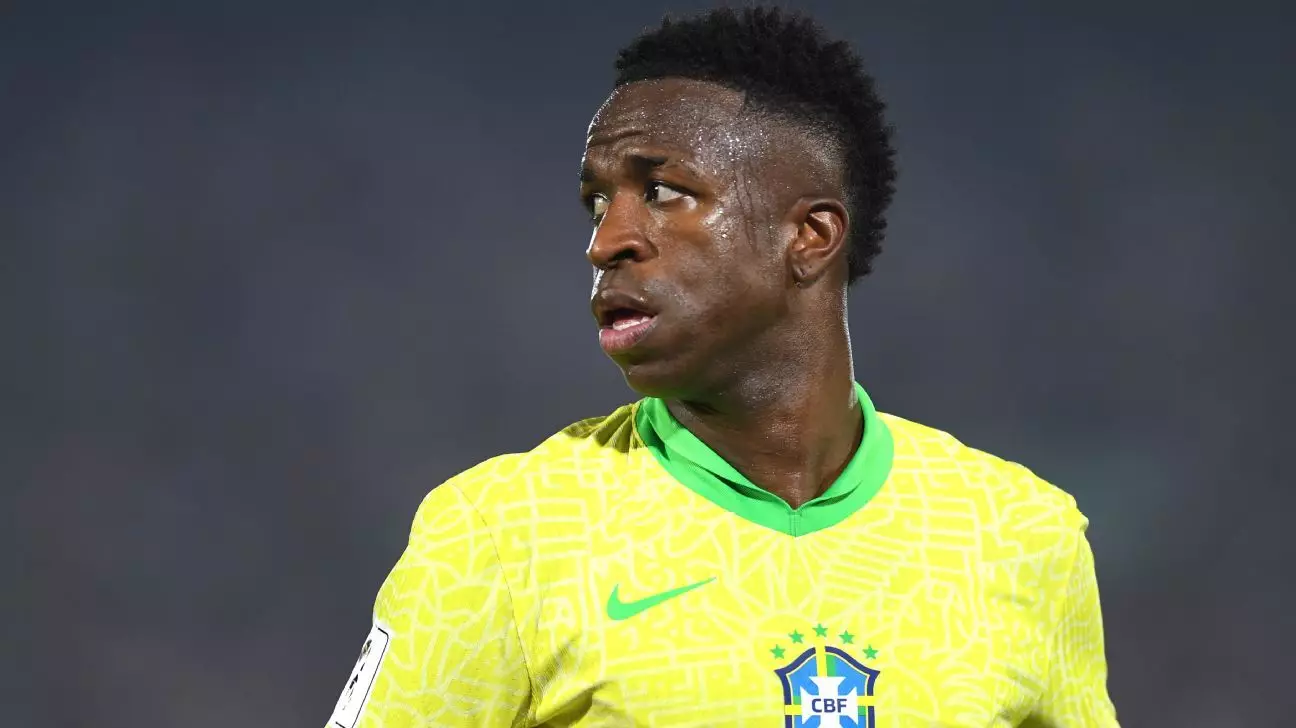Brazil’s recent 4-1 defeat to Argentina in a World Cup qualifier was more than just a loss—it was a stark reminder of the challenges that currently plague a storied footballing nation. This result, particularly devastating given Argentina’s lack of their captain, Lionel Messi, highlights deeper issues within the Brazilian squad. Following the match, Vinícius Júnior candidly called for a reassessment of their current strategy and mindset. His words encapsulate the emotional weight of this setback, signaling that the Brazilian footballing machine is at a crossroads.
In the wake of such a crushing defeat, one cannot help but feel that this moment should act as a catalyst for change. Brazil’s performance, exemplified by a mere single shot on target throughout the game, indicates a serious lack of creativity and cohesion on the pitch. This revelation is troubling, especially considering the expectations that accompany the Brazilian national team. Historically, the Selecao has been synonymous with flair, skill, and an unyielding spirit; however, recent performances have fallen woefully short of this lofty standard.
Building a Cohesive Identity
Vinícius mentioned the need for a renewal of the team’s identity and approach. Brazil’s current qualifying campaign shows a disturbing pattern that needs immediate addressing. Currently, they sit fourth in the South American qualifying group, trailing Argentina by ten points. Vinícius’s assertion that they need to “rethink everything” resonates deeply with the reality of their situation. The World Cup is looming on the horizon, and Brazil must harness this urgency to create a new footballing philosophy that garners the trust of its fans and the integrity of its historical roots.
Rivalry with Argentina intensifies the situation. The Argentines have coalesced into a formidable unit that has benefitted from extended periods of collaboration and a clear tactical identity. Through hard work and a collective spirit, they claimed the World Cup and exuded confidence on the pitch. Brazil, in contrast, appears to be struggling with individualism over teamwork, and this was starkly evident in the significant differences between the two teams’ performances during the match.
The Consequences of Overconfidence
Raphinha’s comments before the game undoubtedly added another layer to the already charged atmosphere. While it’s common for players to engage in banter, such overconfidence can often act as a double-edged sword. Argentina’s Julián Álvarez remarked that Raphinha’s comments served as motivation for their side, underlining the necessity for Brazil to maintain humility amid their ambition.
The words of Argentina’s goalkeeper, Emiliano Martínez, add another thought-provoking angle. He suggested that players should let their performances on the pitch do the talking, a philosophy that contrasts sharply with Brazil’s pre-match rhetoric. This cultural difference could point to why Brazil seems to struggle under pressure while Argentina thrives.
The Burden of Expectations
Dorival Júnior, Brazil’s coach, has taken full responsibility for the defeat, acknowledging the gravity of this moment. He has expressed determination to bounce back, but the pressure is mounting. Under his leadership, Brazil has seen a mixed bag of results, raising questions about his capacity to lead them effectively through this turbulent period. If Dorival is unable to quickly rectify the team’s trajectory, whispers of the CBF potentially pursuing Carlo Ancelotti or Flamengo’s coach Filipe Luis won’t die down. This looming specter of a coaching change only adds to the growing tension surrounding the national team.
Fans and pundits alike are eager to see not just a return to form but a commitment to a reimagined approach to the game. Brazilian football has always celebrated individual brilliance, but there is an urgent need to pivot towards building a more cohesive unit. Success requires more than just flair—it necessitates a balance of creativity with tactical discipline, and an understanding that unity is paramount in achieving greatness.
Looking Ahead: A Path of Transformation
With the World Cup only a year away, Brazil must undergo significant transformations if they hope to compete on the world stage. They need a blueprint that encompasses not only technical skills but mental resilience. It’s time the Brazilian players unite under a common goal that advances their national pride and competitive spirit. The essence of Brazilian football has always been intertwined with the heartbeat of its culture—an expression that must be reinvigorated.
If Brazil’s football community rallies behind Vinícius’s call to action, this could signal a seismic shift in how football is played in the country. The layers of potential that exist within this team should not be overlooked; to fulfill that potential, it will require introspection, clarity, and above all, courage to reinvent themselves as a footballing nation. The journey ahead may be steep, but with determination, it could also pave the way for an exhilarating comeback.

